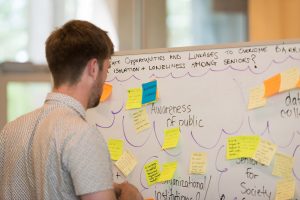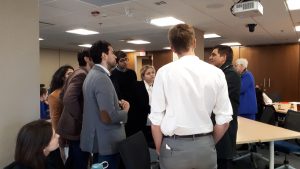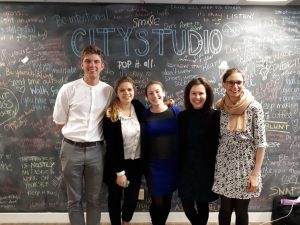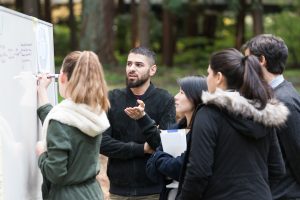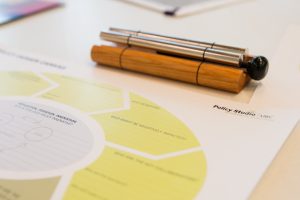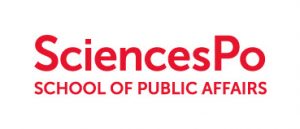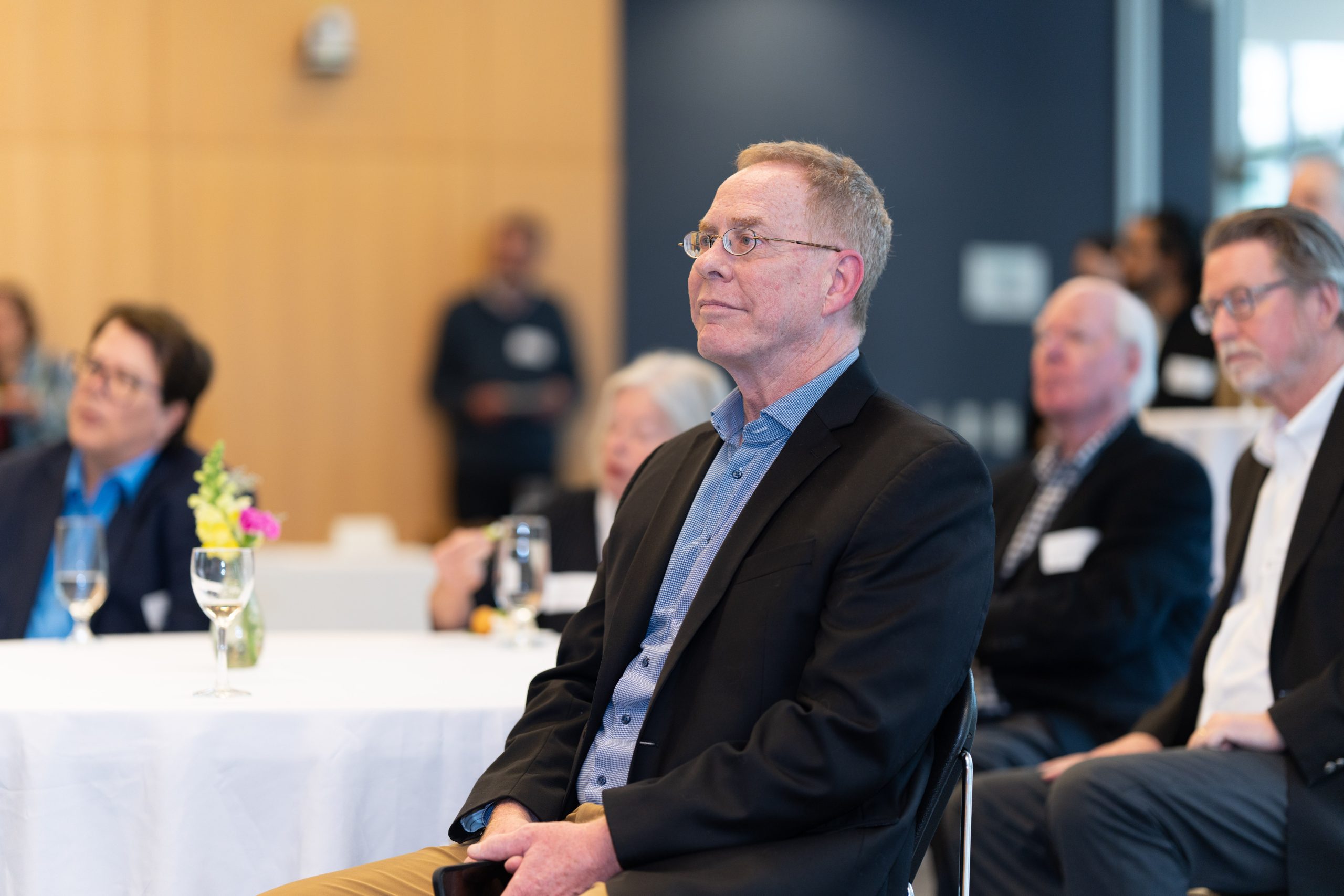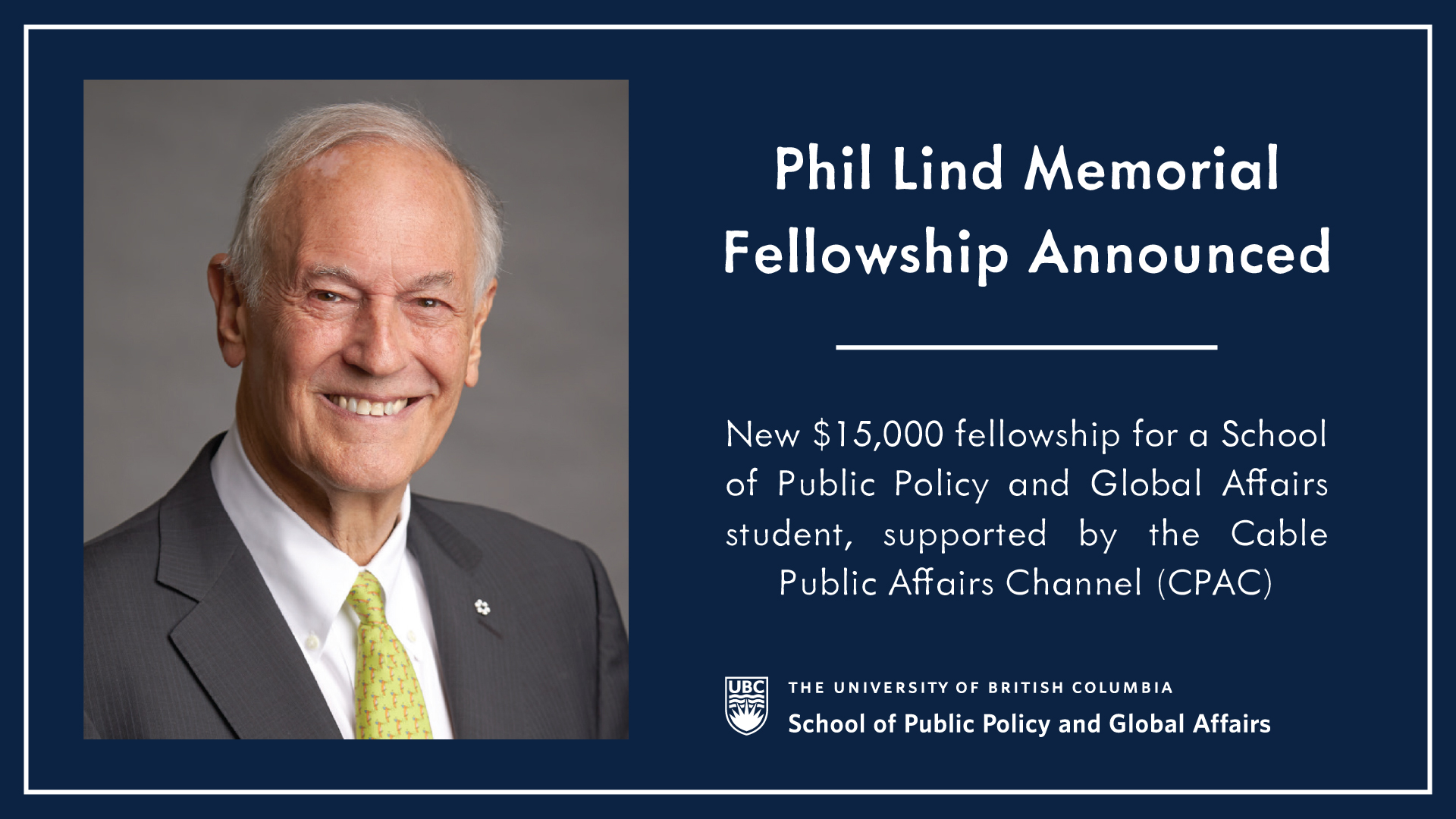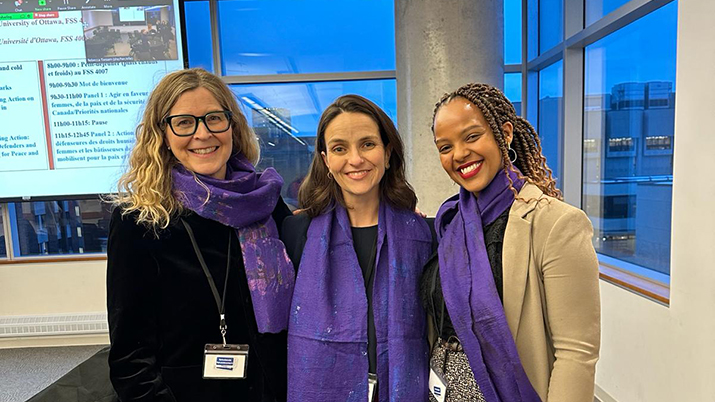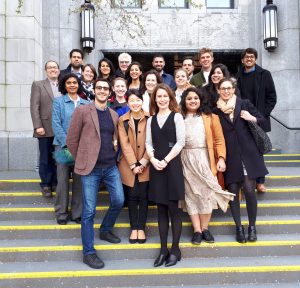

As change becomes more unpredictable and rapid across our cities, regions and the globe, we need to be equipped with new ways to design, develop, and implement policy that values all stakeholders (citizens, government, industry, and institutions). When we bring multi-sector actors together, a clear process framework is essential so there are actual results, not just more talk. UBC and Sciences Po have launched a policy studio/policy lab to bring together multi-disciplinary teams that blend creative and critical thinking techniques to co-create, test and launch resilient solutions to policy challenges. Also not surprisingly, the cities of Vancouver and Paris are both committed to becoming more resilient cities.
The Policy Studio at UBC’s Liu Institute for Global Issues in cooperation with the Policy Lab at the Sciences Po School for Public Affairs recently hosted graduate students during a five day Resilient Cities Policy Challenge, benefitting from the support of the French Embassy in Canada’s Saint-Simon Initiative. The policy challenge involved fifteen students – eight students from the Master of Public Policy and Global Affairs program at UBC and seven students from the Master in Public Policy at SciencesPo – who were integrated into teams to address issues facing three groups in Vancouver: youth, resettled refugees, and seniors.
The policy studio provided students with a structured yet flexible learning opportunity as well as delivered applied policy design and initiative ideas to external stakeholders and clients. Before they delved in, the students were asked to interact with the Policy Challenge clients, which included the City of Vancouver’s Resilient Officer (CRO) Katie McPherson and Paul Mochrie, Deputy City Manager, as well as stakeholders, which included Mary Clare Zak, Managing Director, Social Policy and Project Division in the City of Vancouver’s Social Policy department and Vancouver Foundation President and CEO Kevin McCort.
Students were invited to consider the following overarching question: How might we improve social connectedness in specific populations in Vancouver and Paris with a focus on seniors, youth and refugees? Social connectedness considers the quantity and quality of social relationships as well as structural barriers and opportunities for these to develop. Social connectedness is related to one’s sense of belonging, one’s identity, and one’s sense of community. Social connectedness policies look at places, activities, times, interests and opportunities to enhance social connections. Improving social connectedness is a key element in creating social resilience – a foundational element that allows a community to recover after a time of crisis. There is a need to foster both intercultural connections and understanding as well as intergenerational connections within cities.
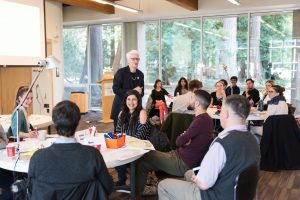

Over five days, students were guided by UBC Professor Moura Quayle and a team of researchers and staff including UBC PhD student Marcelo Bravo, Liu Institute Postdoctoral Fellow Patricia Rios, Sauder School of Business Adjunct Professor Dharini Thiruchittampalam, and MPPGA Manager of Partnerships and Experiential Learning Andrea Reynolds to examine both the problem and possible solutions – who benefits, who are the key players, and how do they collaborate? How can we test the idea? Who are the champions and what are their next steps? The students experience how a structured process, such as a strategic design for policy, can facilitate creativity and provide methods for how individuals and groups can work through complex ideas in a productive way.
The Policy Challenge teams developed and presented eleven ideas while at the Liu Institute for Global Issues and at CityStudio Vancouver. The students also participated in field work at venues that included Sunset Community Centre and Barclay Manor (seniors), Vancouver Community College (youth), and ISSofBC (refugees). These ideas will be proposed in Vancouver’s Resilient City plan for city departments to consider and test. The ideas may then return to the Liu Policy Studio to be further refined. The ideas targeting the three key groups included:
For Resettled Refugees, students proposed developing a Community Fund which would pull from different sources (private, corporate, public) that could support refugees in Vancouver. Government-assisted refugees (GARs) arrive in Canada with immediate debt due to the transportation loan that they must repay the federal government. Since many GARs don’t immediately enter the workforce, a Community Fund would help support them as they get on their feet.
A second and connected idea is launching UNITEA house, a social enterprise run by refugees. Part of the tea house profits would feed into the Community Fund. UNITEA would also foster space for intercultural dialogue between refugees and the community (about refugees’ cultures and journeys) and a social space for refugees where they can expand or develop new skills and gain Canadian experience to boost their careers.
For Youth, students proposed a Cultural Map along the length of the 99 B-line bus route. This might take the form of a physical map on the bus itself and in bus shelters to showcase what shops, stores, cafés, and other spaces are available locally for youth to gather. Youth are a population at risk when it comes to affordable and effective services targeted at them.
A Youth Café was also proposed as a subsidized space for the city’s young people to gather. Casual career coaching from career experts could be provided (ie. interviewing skills, teamwork).
For Seniors, the team proposed an “Age Well” package to provide to a ‘new’ senior residents on the services and programs available to them. This would require a re-think on what it means to be a senior – changing prevalent attitudes and common language about seniors.
The team also proposed an inter-generational co-housing model among seniors, youth and families – a semi-private space to foster connections naturally. This could help seniors and youth overcome isolation and foster interdependence (skill-sharing) and independence.
As Tobin Postma, Director of Strategic Initiatives, City of Vancouver, shared following the presentation of ideas: “It was exciting to see the outputs of the Resilient City Policy Challenge – even after such a short ideation time frame, there were several important insights related to our Healthy City Strategy that zeroed in on ways to address the growing problem of social isolation amongst seniors, youth, and refugees in our city.”
Feedback from student participants included the following:
“This project allowed my colleagues and I to contribute to the process of building resiliency through practice of the skills and understandings we bring with us, and those that we’ve developed through our studies. This was an invaluable learning experience. Personally, I was amazed at how the structured processes we used to develop our ideas brought about such creativity and innovation. At the end of the day it is up to each of us to build bonds and bridges with those around us. This is how we will overcome social isolation and grow to care for one another in a way that will make us resilient in the face of any challenge.”
– MPPGA student Sarah Froese
“Vancouver’s youth is vibrant, diverse and ambitious, yet some feel to some extent disconnected to the city and what is has to offer. Meeting with locals, policymakers and young Vancouverites we’ve tried to understand what barriers youth needed to overcome to foster greater social connectedness, and suggested a range of policy measures relating to culture, employment and transportation to enhance interactions throughout communities. It has been an intense but fun five days of crunching our very different minds to come up with very innovative and easy-to-implement ideas, that can be part of feasible public policies current policymakers should start considering.”
– SciencePo student Josy Soussan
“I think the most useful tool is the system of Ask, Try, and Do which allowed us to narrow down on the problems instead of focusing on the solution.”
– Student participant
“The Policy Design Canvas entailed good questions that helped us think holistically and systematically.”
– Student participant
“The academic facilitation in terms of warm-up exercises and the thinking toolbox were helpful in first creating nebulous ideas and then honing these into a thoughtful process of policy deliverables.”
– Student participant
“Going on a field trip was the most relevant tool – being able to meet and talk to the actual stakeholders helped the group understand the situation and emotions more in depth.”
– Student participant
Summary:
The Saint-Simon Resilient Cities Policy Challenge encouraged innovative thinking about policy processes. This process of strategic design thinking is useful in any field of policy studies – from basic needs addressed, to designing of social experiments, to an overarching test of policy effectiveness. The Policy Challenge provided the City of Vancouver with creative and practical policy ideas to support refugees, youth, and seniors and provided the graduate students with practical, hands-on experience that enhances the skills and theory that they have been learning in their respective policy programs.
